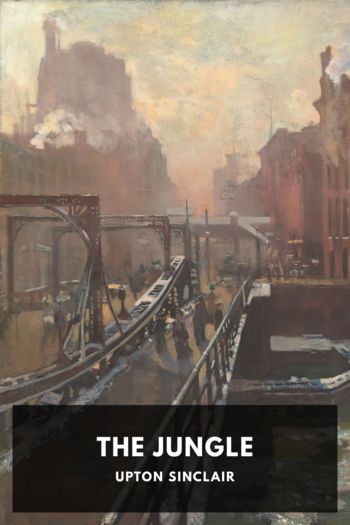Arrowsmith by Sinclair Lewis (learn to read books txt) 📕

- Author: Sinclair Lewis
Book online «Arrowsmith by Sinclair Lewis (learn to read books txt) 📕». Author Sinclair Lewis
“I admit we should not be able to turn out doctors to cure village bellyaches. And ordinary physicians are admirable and altogether necessary—perhaps. But there are too many of them already. And on the ‘practical’ side, you gif me twenty years of a school that is precise and cautious, and we shall cure diabetes, maybe tuberculosis and cancer, and all these arthritis things that the carpenters shake their heads at them and call them ‘rheumatism.’ So!”
He did not desire the control of such a school, nor any credit. He was too busy. But at a meeting of the American Academy of Sciences he met one Dr. Entwisle, a youngish physiologist from Harvard, who would make an excellent dean. Entwisle admired him, and sounded him on his willingness to be called to Harvard. When Gottlieb outlined his new sort of medical school, Entwisle was fervent. “Nothing I’d like so much as to have a chance at a place like that,” he fluttered, and Gottlieb went back to Mohalis triumphant. He was the more assured because (though he sardonically refused it) he was at this time offered the medical deanship of the University of West Chippewa.
So simple, or so insane, was he that he wrote to Dean Silva politely bidding him step down and hand over his school—his work, his life—to an unknown teacher in Harvard! A courteous old gentleman was Dad Silva, a fit disciple of Osler, but this incredible letter killed his patience. He replied that while he could see the value of basic research, the medical school belonged to the people of the state, and its task was to provide them with immediate and practical attention. For himself, he hinted, if he ever believed that the school would profit by his resignation he would go at once, but he needed a rather broader suggestion than a letter from one of his own subordinates!
Gottlieb retorted with spirit and indiscretion. He damned the People of the State of Winnemac. Were they, in their present condition of nincompoopery, worth any sort of attention? He unjustifiably took his demand over Silva’s head to that great orator and patriot, Dr. Horace Greeley Truscott, president of the University.
President Truscott said, “Really, I’m too engrossed to consider chimerical schemes, however ingenious they may be.”
“You are too busy to consider anything but selling honorary degrees to millionaires for gymnasiums,” remarked Gottlieb.
Next day he was summoned to a special meeting of the University Council. As head of the medical department of bacteriology, Gottlieb was a member of this all-ruling body, and when he entered the long Council Chamber, with its gilt ceiling, its heavy maroon curtains, its somber paintings of pioneers, he started for his usual seat, unconscious of the knot of whispering members, meditating on far-off absorbing things.
“Oh, uh, Professor Gottlieb, will you please sit down there at the far end of the table?” called President Truscott.
Then Gottlieb was aware of tensions. He saw that out of the seven members of the Board of Regents, the four who lived in or near Zenith were present. He saw that sitting beside Truscott was not the dean of the academic department but Dean Silva. He saw that however easily they talked, they were looking at him through the mist of their chatter.
President Truscott announced, “Gentlemen, this joint meeting of the Council and the regents is to consider charges against Professor Max Gottlieb preferred by his dean and by myself.”
Gottlieb suddenly looked old.
“These charges are: Disloyalty to his dean, his president, his regents and to the State of Winnemac. Disloyalty to recognized medical and scholastic ethics. Insane egotism. Atheism. Persistent failure to collaborate with his colleagues, and such inability to understand practical affairs as makes it dangerous to let him conduct the important laboratories and classes with which we have entrusted him. Gentlemen, I shall now prove each of these points, from Professor Gottlieb’s own letters to Dean Silva.”
He proved them.
The chairman of the Board of Regents suggested, “Gottlieb, I think it would simplify things if you just handed us your resignation and permitted us to part in good feeling, instead of having the unpleasant—”
“I’m damned if I will resign!” Gottlieb was on his feet, a lean fury. “Because you all haf schoolboy minds, golf-links minds, you are twisting my expression, and perfectly accurate expression, of a sound revolutionary ideal, which would personally to me be of no value or advantage whatefer, into a desire to steal promotions. That fools should judge honor—!” His long forefinger was a fishhook, reaching for President Truscott’s soul. “No! I will not resign! You can cast me out!”
“I’m afraid, then, we must ask you to leave the room while we vote.” The president was very suave, for so large and strong and hearty a man.
Gottlieb rode his wavering bicycle to the laboratory. It was by telephone message from a brusque girl clerk in the president’s office that he was informed that “his resignation had been accepted.”
He agonized, “Discharge me? They couldn’t! I’m the chief glory, the only glory, of this shopkeepers’ school!” When he comprehended that apparently they very much had discharged him, he was shamed that he should have given them a chance to kick him. But the really dismaying thing was that he should by an effort to be a politician have interrupted the sacred work.
He required peace and a laboratory, at once.
They’d see what fools they were when they heard that Harvard had called him!
He was eager for the mellower ways of Cambridge and Boston. Why had he remained so long in raw Mohalis? He wrote to Dr. Entwisle, hinting that he was willing to hear an offer. He expected a telegram. He waited a week, then





Comments (0)